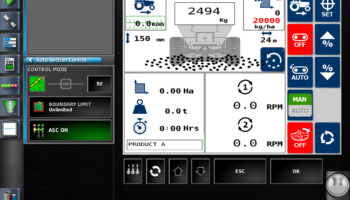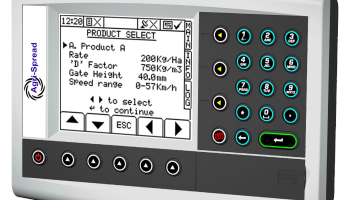With the increasing demand for precision farming world wide, AgriSpread have developed a range of rate controller options that are currently leading the market. The systems developed by AgriSpread can work in conjunction with or without weigh scales.
With weigh scales, the controller can work in two ways.
- It can use the weigh cells to auto-calibrate bulk products on the move with minimum user input. This is called dynamic mode. Useful for bulk products like lime, litter etc where the bulk density is constantly changing from load to load.
- For precision spreading, static mode can be used for precision applications. The weigh scales are used for precision nudging to get precision application rates.
With out weigh scales the controller is calibrated to use the product density, door height, spread width and driving speed to obtain the correct application rates.
All rate controllers developed by AgriSpread also control the spinner speed for constant and accurate spread width. Headland control is also an option where by the user can lower the speed of one spinner to reduce the over-through of material into the headland.
ISOBUS
Isobus is a monitoring and application control system for self-propelled / trailed belt spreaders spreading lime / granular materials. Forward speed measurement and cutout sensing enables full proportional control, to maintain (within limits) a set application irrespective of changes in forward speed. The four major components are Spreader ECU, Load Cell ECU and Loadcells.
Machines without loadcells: The system relies on volumetric calculation from the known gate height and width, and a known product density (or selecting the product from a pre-defined list). It works best for relatively free-flowing material of consistent density.
Machines with loadcells: Loadcells enable fully-automatic, continuous calibration. There are advantages for controlling the rate of material with more variable density. By constantly measuring the weight of product in the spreader, the floor speed is continuously adjusted to achieve the correct target application rate. The system therefore quickly reacts to changes in product characteristics or spreading conditions without having to adjust or re-calibrate the machine.
ISOBUS Features
- Application Rate control proportional to Forward speed by hydraulic floor speed
- Weighing – Displays Live weight from Load Cells and self calibrates
- Ability to change the application rate on the move
- Precision Farming capability
- Traceability records with GPS positioning
- Spinner speed Monitoring with optional border/headland management
- GPS Forward speed with back-up wheel speed sensor
- ISOBUS Capability from the CAN based ECU
- Ability to use existing tractor terminal
- Factory support on spreader software
- Real time weight logging
- Dynamic spreading using load cells
- Simple software updates for next generation software
- Precision Farming (e.g. application from treatment plan, receiving a rate from a 3rd party controller
- Auto-shutoff (Required unlock on 3rd party Controller)
- Headland Border Control (Spinner reduction from in cab at the touch of a button)
- Real time weight logging
- Independent spinner monitoring
- Load cells readings and dynamic rate control
PSI Apollo
The Psi Apollo is a monitoring and application control system for self-propelled / trailed belt spreaders spreading lime / granular materials. Forward speed measurement enables full proportional control, to maintain (within limits) a set application irrespective of changes in forward speed. The four major components are the head unit, Spreader ECU, Load Cell ECU and Loadcells.
Machines without loadcells: The system relies on volumetric calculation from the known gate height and width, and a known product density (or selecting the product from a pre-defined list). It works best for relatively free-flowing material of consistent density.
Machines with loadcells: Loadcells enable fully-automatic, continuous calibration. There are advantages for controlling the rate of material with more variable density. By constantly measuring the weight of product in the spreader, the floor speed is continuously adjusted to achieve the correct target application rate. The system therefore quickly reacts to changes in product characteristics or spreading conditions without having to adjust or re-calibrate the machine.
PSI Apollo Features
Standard
- Precision Farming (e.g. application from treatment plan, receiving a rate from a 3rd party controller)
- Application Rate control proportional to Forward Speed by hydraulic floor speed
- Ability to change the application rate on the move
- Traceability records with GPS Positioning
- Spinner Speed Control and Monitoring
- GPS Forward Speed
Optional
- Weighing – Displays live weight from Load cells and self calibrates
- Load cells – dynamic calibration on the move. Feature that enables the load cells to auto calibrate the application rate on the move


